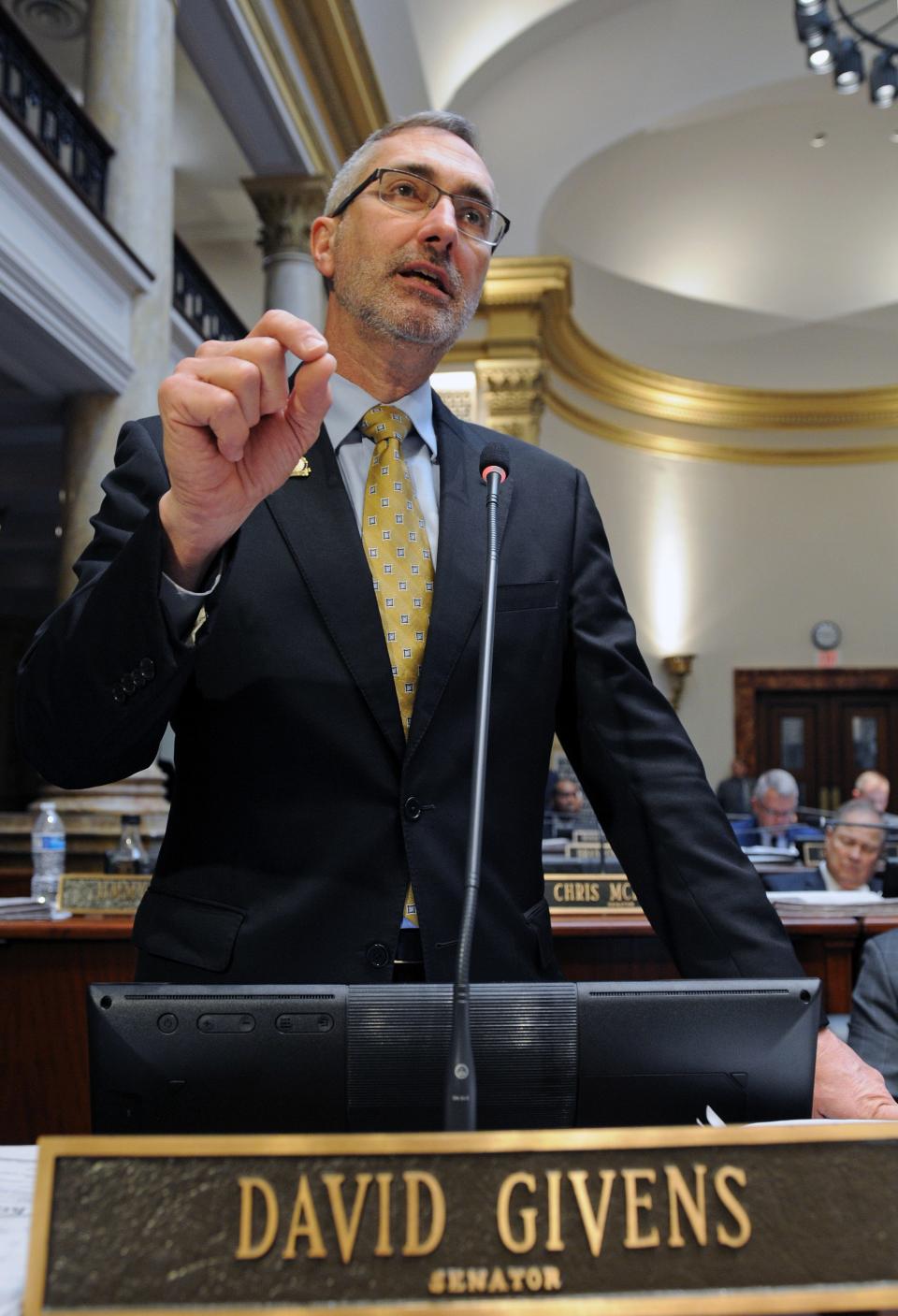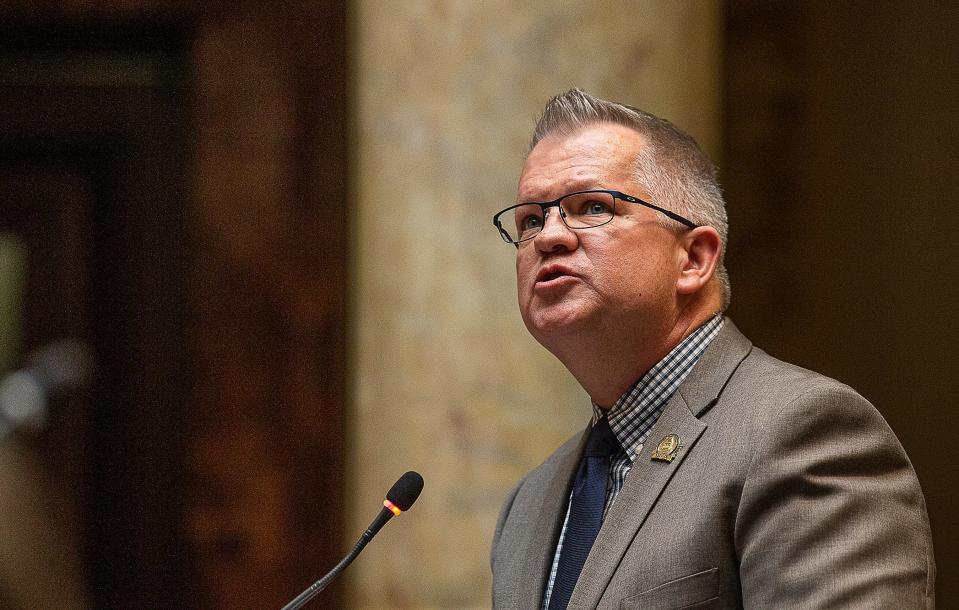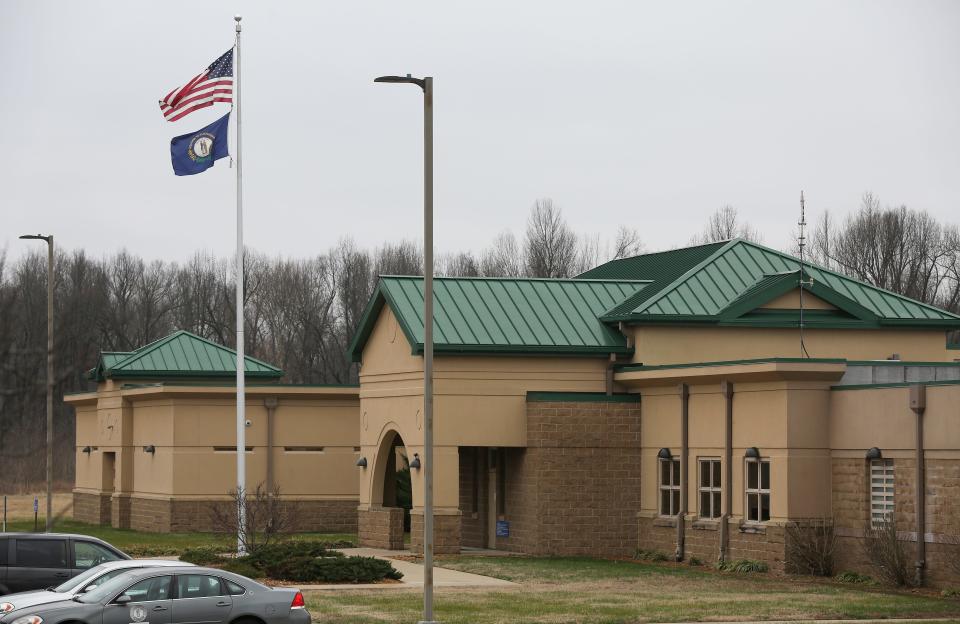Kentucky's juvenile justice system is in crisis, audit says. How will lawmakers respond?
FRANKFORT — Sen. David Givens would later apologize for raising his voice, but he couldn’t help himself last week as he discussed findings in a searing audit of Kentucky’s Department of Juvenile Justice.
The 2022 riot at a youth detention center in Adair County and its aftermath still haunt him.
"Now, when the Adair (center) folks call me that live in Green County and are scared to go to work, Mr. President, I don't blame them," the Republican from south-central Kentucky said on the Senate floor. "... And if my anger bothers you, it pales in comparison to what these young people are going through."
Givens was devastated by the audit from CGL Management Group, released late last month by state Auditor Allison Ball. Its 231 pages detailed persistent problems in the Department of Juvenile Justice's eight detention centers and provided recommendations on how to move forward.
Ball, a Republican who took office in last year's election, placed blame at the feet of Gov. Andy Beshear, citing a "lack of leadership" in his office, and Givens agreed. The audit said most actions recommended in a separate 2017 review of the juvenile justice system have not been implemented, and little progress appears to have been made on measures approved in the 2023 General Assembly, he said.

Givens was clearly shaken as he recalled the day of the Adair County riot, which included vandalism, attacks on other youths on site and a sexual assault of a girl at the complex, which neighbors his district.
"We have a riot in Adair County where the young people take over the facility. The governor calls us and says, 'I have a crisis, I need help,' and we respond and they don't even follow our action plan," he said, slamming a copy of the report on his desk. "... Not only is the Department of Juvenile Justice broken, it is not even being fixed by this Beshear administration. And it's with sadness, genuine sadness, that I say those things."
Beshear's Justice and Public Safety Cabinet pushed back on some of the report's findings, arguing that statements made on the Senate floor that the department is out of compliance with recent laws are false — and criticizing the process ahead of the audit's publication.
Further improvements are needed, the statement provided by cabinet communications director Morgan Hall acknowledged, notably with incomplete records at some facilities. But Department of Juvenile Justice officials weren't able to review the audit until it was published, she said in an email, and as a result the report was inaccurate in its criticism of use-of-force policies and did not include findings previously reported to the Legislative Oversight and Investigations Committee.
Speaking Thursday to reporters in Frankfort, Beshear implied the audit was a "political tool" published with a lack of communication that resulted in two findings concerning use-of-force policies and centers' lack of collaboration with local law enforcement agencies that were "entirely and fully wrong."
Senate Minority Leader Gerald Neal, a Louisville Democrat and former juvenile probation officer, said he was as angry as Givens, but issues have persisted under several governors and around the U.S. The report noted staffing shortages and the aftermath of the COVID-19 pandemic — two key issues behind the problems at Kentucky's juvenile detention facilities — are a nationwide problem.
“There’s a lot of ways to go about something, and one way of going about it is coming together to work it out as opposed to pointing the finger," Neal said. "... We should focus more on the problem and come together with solutions that are obviously not simple, that stretch over many administrations, and let’s work in good faith for a resolution to the problem.”
Other legislators say they've been working together to push back against ongoing issues, with more help on the way.

Sen. Danny Carroll, R-Paducah, chair of the Senate Families and Children Committee, said more legislation to address the problems will be filed this month, piggybacking on laws put in place in the 2023 General Assembly. And the House's budget bills, which have advanced for review in the Senate, have funds set aside to go toward improving the state's juvenile detention centers.
Issues have persisted within the department's facilities for years. And with the 2024 General Assembly about halfway finished, legislators are hoping to take action.
A blistering report
Problems inside the state's juvenile justice facilities have been known for years. But the new audit highlights the uphill climb Kentucky is facing.
It paints a bleak picture inside the walls of the state's juvenile detention centers — in Adair, Boyd, Breathitt, Campbell, Fayette, Jefferson, McCracken and Warren counties.
Isolation of kids is used too often and in many cases as a punitive measure instead of one to keep staff and other children safe. The report found 1,579 instances of isolation through just eight months in 2023, a rate of 197 per month.
Use of force is also too common, it found, with no policy in place for using chemical agents, tasers — which have been distributed at several locations without direction or serious training — and other security control devices. At the Adair County Juvenile Detention Center alone, with a capacity of 80 kids, pepper spray was deployed 41 times in the first 10 months of 2023.
The justice cabinet took issue with some of the report's findings, though. A use-of-force policy was put in place by the department a year ago, the cabinet's statement said, and each detention center has a memorandum of understanding with a local law enforcement agency in the event of an emergency on site, despite suggestions to the contrary.
Beshear said state officials "always want to do better" and learn from incidents that arise. But equipping officers with pepper spray was "absolutely necessary," he said. Larry Chandler, the department's current interim commissioner, "thinks we’ve seen about a 40% decline in violent incidents since its introduction," the governor said.
Cases of isolation need to be thoroughly reported, Beshear added — he was critical of infrequent documentation within the department. But each incident takes place under unique circumstances, and the definition of isolation can differ between evaluations, he added, arguing sometimes a kid in custody needs to be separated in a different living area from other youths to prevent violence due to "serious gang issues."
"This is a system that’s seen more violent offenders that have been through more trauma than we’ve ever seen in the system," Beshear said. "So, that takes facilities that are more secure than they’ve ever been, and it also creates more challenges that we have to adapt to."
The report also found issues with education of detained children, a lack of mental health specialists and nursing staffers due in part to relatively low pay and methods that don't reward good behavior but instead rely on discipline.
A 2022 move from regional detention centers to splitting up kids between low-security and high-security locations has isolated children in custody and made traveling to court dates difficult. That change in policy was put in place by Beshear after the 2022 riot and sexual assault in Adair County — less than three months earlier, three youths in Warren County attacked staff and a teen briefly escaped from a facility in Jefferson County after two fires were started when another youth smuggled a lighter inside.

Beshear called that change the biggest Kentucky's juvenile justice system had seen in 20 years when it was announced, and the move was applauded by some GOP legislators, with Sen. Whitney Westerfield, R-Crofton, noting issues within the department had existed for years.
Many of those issues still haven't been addressed, with staffing still at critical lows (the report found a correction officer vacancy rate at just over 25%, with a high rate of new hires, though the justice cabinet said numbers have improved in recent years) and few improvement measures recommended in 2017, when staff levels were still a key issue, having been implemented.
Turnover has been an issue in leadership posts as well.
The state's Department of Juvenile Justice has had five commissioners since 2016, and the latest, Vicki Reed, resigned at the start of 2024 in the wake of several controversies during her tenure. Chandler, the office's former deputy director of the office of detention, is currently leading the department. Former Justice and Public Safety Cabinet Secretary Kerry Harvey has also retired effective this month, with former deputy director Keith Jackson taking over in the interim.
The cabinet touted Chandler as a leader with a "storied career" running six Kentucky prisons, though Beshear's office did not say whether there's a timetable in place to land permanent hires when asked this week.
But Givens said a void at the top of the Department of Juvenile Justice has been there for years — "in the absence of leadership," the senator said, "a problem spirals into a crisis."
Carroll noted the same leaders who were in charge at Adair County during the riot are still in charge, for reasons he doesn't understand.
And Terry Brooks, executive director of the Kentucky Youth Advocates children's advocacy group, said his group is keeping a close eye on the next steps at the top of the department.
"The first — and most important — step toward a process of change will be around the naming of the new Cabinet Secretary and DJJ Commissioner," Brooks said in an email. "Candidly, I will know everything I need to know about the potential for and commitment to reform in DJJ when those names are announced."
Starting salaries for corrections officers have risen in recent years. Pay rates currently start at a little over $39,000 annually, the report notes, although a $5.23 hourly increase described on online applications as a "temporary measure being taken by the department to improve recruitment and retention to meet the continuing critical staffing needs" bumps that annual rate up to $50,000. That measure was put in place by Beshear a year ago, the justice cabinet's statement said.
"Staffing is the No. 1 way that we need to continue to grow that will improve the level of safety in the facilities," Beshear said Thursday. "But I will tell you the raises that were really needed are working.”
But Givens said it's been proven that throwing money at the problem isn't the answer. Beshear requested about $129 million annually for Department of Juvenile Justice funding in the 2022-24 budget, and the GOP's budget that was eventually approved topped that by about $9 million in both years.
"This additional money was in the general fund providing DJJ with flexibility on how it can be used, including increasing staffing," Givens said. "We're not going to engage in any conversation about lack of resources or lack of funding. The governor asked for $130 (million) and we gave almost $140 (million) every year of the biennium to do this."
How will lawmakers respond?

Carroll followed Givens on the Senate floor after his speech on Feb. 1 and said he plans to bring forward a bill to build two new centers for girls, in Fayette County and in Western Kentucky, in order to house them separately from boys. That legislation has not yet been filed, but Carroll expects that to happen sometime in the next few weeks.
And the Republican budget proposal, which won approval in the House last week, would set aside about $180 million in 2024-25 and just over $200 million in 2025-26 for juvenile justice, with noted expenditures including:
$20 million for a new youth medical services contract;
$7.8 million yearly for detention alternatives;
$3.5 million yearly for evidence-based programming for "additional social service specialists, youth screening tools" and training;
about $3.5 million for debt service;
and $2.7 million for new juvenile transportation vehicles.
The proposal also calls on the department to bring a report to a state committee this September on design and cost parameters of renovating Louisville's juvenile detention center, with about $39 million from the general fund and bond funds set aside for that project.
An additional $7.5 million is set to go toward renovating a juvenile detention center in Lyndon — it closed at the end of 2022, but state officials announced plans to reopen it the following January. And Beshear said he would've liked to see money set aside in it to go toward upgrading facilities in Fayette and McCracken counties.
The budget proposal comes on the heels of other actions taken in recent legislative sessions. The 2024 General Assembly won't wrap up until mid April.
The Kentucky legislature made juvenile justice a priority last year in the aftermath of the Adair riot.
The 2023 General Assembly passed House Bill 3 and Senate Bill 162, which authorized money to reopen the Jefferson County Youth Detention Center, added language to current law to tighten rules for youths charged with violent crimes, pushed to open a centralized data tracking system along with improving mental health services and reviewing current policies, among other changes. Beshear signed the bills from sponsors Rep. Kevin Bratcher, R-Louisville, and Carroll, despite concerns from Democrats in Frankfort.
Senate President Robert Stivers, R-Manchester, told reporters this week that the legislature stepped up last year with a budget that provided more money for juvenile justice than had been requested, but the system is still failing a "very fragile population" of kids who may not have much parental involvement and who need help. He was critical of Beshear and of the executive branch's efforts to put that money to good use.
"We gave you more than what you asked, so you still haven't been able to put water on the Dumpster fire," Stivers said. "He asked us for the policy that he wanted. We gave it to them. They execute on that policy — and 15 months later have failed still to execute on that policy. So, getting a cabinet secretary, getting the right commissioners, getting the right leadership is all about what the executive branch can do."
The right leaders can make all the difference, Brooks said.

The head of Kentucky Youth Advocates pointed toward another department under Beshear, the Kentucky Cabinet for Health and Family Services, as an example. That office has "extraordinary leadership" in Secretary Eric Friedlander and other commissioners, he said, who focus on quality, problem solving, upstream solutions and responding "when the inevitable crises emerge."
"In contrast, the juvenile justice system has lacked bold leadership; is marked by wildly different — and almost antithetical — practices and results from region to region; and, exudes a mentality of simply addressing one tragedy after another," Brooks said.
"Solving the juvenile justice crisis in Kentucky is neither a simple nor quick fix. But a thoughtful next step may be to think about what has made the Beshear child welfare effort such a positive force and apply those lessons to juvenile justice."
Reporters Hannah Pinksi and Rebecca Grapevine contributed. Reach Lucas Aulbach at [email protected].
This article originally appeared on Louisville Courier Journal: Report rips Kentucky juvenile justice, drawing General Assembly concern
